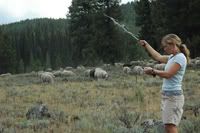Idaho Wolves plague Sheep, What do they do to Mule Deer
This young gal is long on sincere and short on smarts. She wants to teach the wolves some manners and keep the mountain maggots in pens at night. We need more volunteers like her – a lot more.
————————————
Can wolves and sheep coexist here?
IDFG considering whether to kill off Phantom Hill wolf pack
By JASON KAUFFMAN
Express Staff Writer ———————————–
|
Raising her handheld radio telemetry receiver above her head just before nightfall on Monday, Cindi Hillemeyer scanned the surrounding hills of the Smoky Mountains for a sign of the elusive Phantom Hill wolf pack.
A volunteer with Fish and Game, Hillemeyer has spent much of her summer tracking the movements of the wolf pack in an attempt to keep them away from grazing sheep. Along with her Fish and Game-issued radio telemetry receiver, she also carries a single-barrel shotgun along with non-lethal rubber bullets to scare wolves that may venture too close to sheep.Hillemeyer’s solitary task is a tall order, especially given the six-member wolf pack’s expansive home range roughly coincides with several federal sheep grazing allotments in the upper Wood River Valley. While at least one local sheep producer—Hailey-based Lava Lake Land and Livestock—elected to remove sheep from its grazing allotments earlier this summer after the pack was discovered, other grazers have chosen not to. One of those sheep ranchers—John Faulkner, of Gooding-based Faulkner Land and Livestock Co.—began to lose some of his sheep to wolf depredations on July 10 and 12. The sheep-killing incidents didn’t end there.Both Hillemeyer and Fish and Game’s large carnivore manager, Steve Nadeau, confirmed Monday that the wolf pack has continued to stay in close proximity to Faulkner’s bands and have been involved in repeated sheep killings. Such incidents are the reason Hillemeyer has spent numerous days and nights alone in the field monitoring the movements of the Phantom Hill wolves.
The killings are also why Nadeau is giving serious consideration to the pack’s continued existence. The option to kill off the pack was never out of the realm of possibility, he said Monday.
“It’s always been in the cards,” he said.
During an interview by telephone, Nadeau said a determination about whether agents with the U.S Department of Agriculture’s Wildlife Services would be called on to kill off the pack could happen soon. He said the decision—which is largely his to make—would be based in part on a detailed tally of Faulkner’s sheep that was to take place Monday evening in the Baker Creek area.
During Monday’s sheep count, lambs from the band were loaded onto out-of-state-bound trucks, while the adult ewes remained on-site and were joined by additional sheep.
Sheepherders looking after Faulkner’s sheep have reported continued losses throughout the past few weeks, Nadeau said.
“They continue to pluck away sheep,” he said.
What’s really needed, Hillemeyer said, is a stronger focus on instituting non-lethal methods to keep sheep and wolves separate. These can include putting sheep in protective electric-wire enclosures at night and placing more guard dogs with sheep bands—measures some sheep grazers have instituted with success, she said.
“I feel like that could shape a future for coexistence,” Hillemeyer said.
In response to a comment Nadeau made on Monday concerning the temporary nature of such non-lethal measures, she said the same can be said for killing off wolf packs without first trying to encourage them to stay away from sheep. Just as generations of wolves can learn bad habits like preying on sheep, so too can they learn to avoid sheep, she said.
By late afternoon Tuesday, information about whether the Phantom Hill pack was definitely marked for extermination was unavailable. Check the Idaho Mountain Express Web site at www.mtexpress.com for continued coverage of this ongoing issue.
 Wood River Valley resident Cindi Hillemeyer scans the surrounding Smoky Mountains with a handheld radio telemetry receiver in attempt to locate the Phantom Hill wolf pack’s two radio collared wolves Monday evening. This summer, Hillemeyer has been working as a volunteer with the Idaho Department of Fish and Game tracking the movements of the pack in an attempt to keep them away from bands of sheep that are grazing federal grazing allotments. Photo by Jason Kauffman
Wood River Valley resident Cindi Hillemeyer scans the surrounding Smoky Mountains with a handheld radio telemetry receiver in attempt to locate the Phantom Hill wolf pack’s two radio collared wolves Monday evening. This summer, Hillemeyer has been working as a volunteer with the Idaho Department of Fish and Game tracking the movements of the pack in an attempt to keep them away from bands of sheep that are grazing federal grazing allotments. Photo by Jason Kauffman 